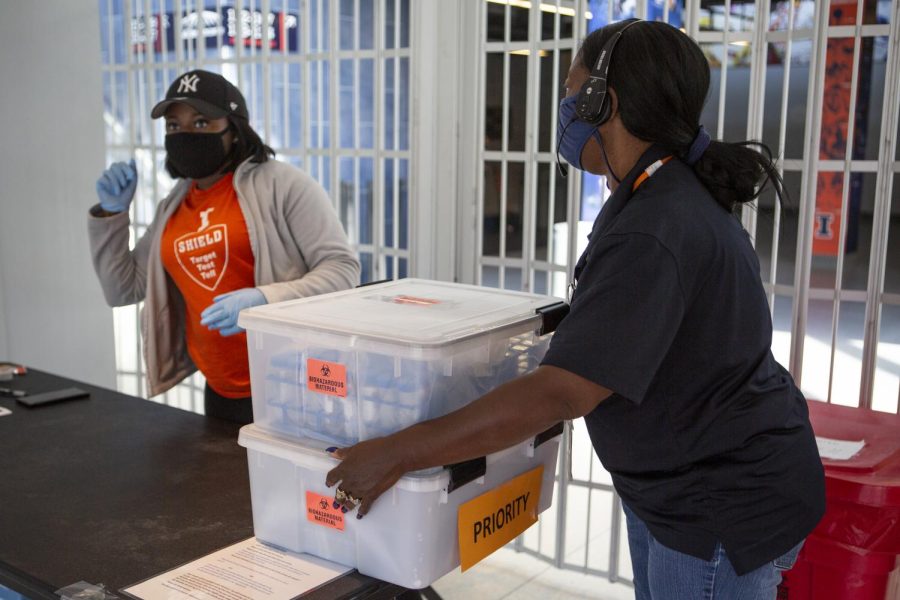Statewide policy change voids Senate resolution on contact tracing
SHIELD testing workers take away a container filled with Covid-19 tests at State Farm Center on Oct. 9, 2020. CUPHD plans to work with SHIELD and other services in regards to contact tracing and the new statewide policy.
Feb 24, 2022
A University of Illinois Urbana-Champaign Senate resolution on contact tracing has run into difficulties due to statewide changes to the contact tracing policy. There have been calls for the University to develop an independent contact tracing entity to provide instructors with rapid exposure notifications.
RS.22.02 called for Champaign-Urbana Public Health District contact tracers to inform professors of positive COVID-19 cases and collect details about the interactions of people who test positive.
Since Jan. 1, contact tracing in Illinois has been managed exclusively by the Illinois Department of Public Health through an opt-in system. This is intended to serve individuals who are at higher risk than the general population.
Awais Vaid, deputy administrator and epidemiologist at CUPHD, noted that contact tracing may have limited usefulness in the classroom environment.
“Notifying individuals about classroom exposures would be a very small percentage of people that would be documented,” Vaid said. “Even with that, the information that is being captured would be delayed by days.”
Get The Daily Illini in your inbox!
The goal of the resolution was for CUPHD to provide notification of positive cases to instructors within two days. It references the system employed by University of Illinois at Chicago, which runs independently through UIC’s Contact Tracing and Epidemiology Program and provides notifications rapidly.
The shift to a statewide opt-in system leaves the University without an extensive system to notify instructors of positive cases within classrooms.
Bruce Rosenstock, sponsor of the resolution and a senator from the religion department, believes that the University should institute its own contact tracing system now that CUPHD can no longer provide this service.
“I believe that we ought to do contact tracing on our own,” Rosenstock said.
His proposal would involve collaboration between McKinley Health Center, SHIELD testing and the College of Applied Health Sciences. According to Rosenstock, this would include “a team of interns and students who would do contact tracing for each student who tests positive on our campus.”
The team’s main task would be to reach out to instructors, find out who the infected person interacted with and notify persons who could have potentially been exposed. Vaid mentioned that methods such as testing and across-the-board contact tracing, which would have been viable a year ago, are no longer the best use of resources.
“I don’t think that testing two, three, or even seven times a week is the most appropriate use of resources,” Vaid said. “We are moving now from a pandemic stage to learning to live with COVID-19 through an endemic stage. What is more important is to consider how we can protect the most vulnerable populations and keep hospitalizations down.”
With the news of Gov. J.B. Pritzker’s decision to repeal the mask mandate by the end of the month, Rosenstock expressed concern over the increased hazard of transmissibility and believes potentially exposed students must be tested immediately.






